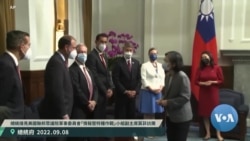The U.S. Congress shows its growing support for Taiwan.
Welcome to VOA Asia Weekly. I'm Chris Casquejo in Washington. That story just ahead, but first, making headlines.
Hong Kong said it is considering relaxing its COVID-19 hotel quarantine policy for an "orderly opening-up." Currently, travelers from other countries must pay for three days in a hotel then self-monitor for four days.
The leaders of Japan and South Korea agreed Wednesday that the two nations need to restore sound bilateral ties and deepen cooperation to deal with North Korea’s nuclear threats. Japanese Prime Minister Fumio Kishida and South Korean President Yoon Suk Yeol held their 30-minute talk on the sidelines of the annual U.N. General Assembly.
Government helicopters in Myanmar attacked a school and village in the north-central part of the country, killing at least 13 people including seven children. The military-controlled government blamed armed opposition groups.
A Chinese Foreign Ministry spokesperson called for “dialogue and consultation” after Russian President Vladimir Putin vowed Wednesday to use "all available means" to protect Russian-held territory in Ukraine.
The USS Ronald Ronald Reagan aircraft carrier strike group arrived in the South Korean port city of Busan in preparation for a large-scale joint military drill happening for the first time since 2017, a significant show of strength amid concerns North Korea will soon conduct a nuclear test.
A military exercise in Fiji involving the United States, Britain, Australia and New Zealand ended this week as the traditional allies try to counter China's growing influence in the region. U.S. President Joe Biden has invited Fiji and 11 other small Pacific Island nations to take part in a summit next week at the White House.
China said it has made "solemn complaints" with the U.S. over President Biden's statement that U.S. forces will defend Taiwan if China tries to invade the self-ruled island.
Biden said "yes" when asked during an interview broadcast on CBS News's "60 Minutes" program whether "U.S. forces, U.S. men and women, would defend Taiwan in the event of a Chinese invasion.
But addressing the U.N. General Assembly, Biden said this.
Regarding China, Biden also said that the U.S. will not ask any nation to choose between the United States or any other partner.
A bipartisan group of U.S. lawmakers met with Taiwanese President Tsai Ing-wen earlier this month – the latest show of support from the U.S. Congress to the island republic amid heightened tensions with China. VOA’s Katherine Gypson spoke with members of the delegation.
Renewed support for Taiwan as yet another bipartisan Congressional delegation calls for deeper ties in the face of threats from China.
"Our delegation as with every congressional delegation that has visited is a symbol of Congress's rock-solid commitment to Taiwan."
This latest visit follows Nancy Pelosi’s historic trip last month – the first by a U.S. Speaker of the House in 25 years.
“Our policy has always been strategic ambiguity, instead of strategic clarity. But that was many, many years ago, 40 years ago, almost. And what we need to look at is, China has changed dramatically in that period of time, they were not nearly the significant military or economic power that they are today.”
The Biden administration approved $1.1 billion in arms sales to Taiwan – a move that drew swift condemnation from China.
"The U.S.' arms sale to Taiwan blatantly violates the one-China principle and the provisions of the three China-U.S. Joint Communiqués, especially the August 17 Communiqué, seriously undermines China's sovereignty and security interests, severely damages China-U.S. relations and peace and stability in the Taiwan Strait and sends seriously wrong signals to the separatist forces of Taiwan independence.”
But there is bipartisan support in the U.S. Congress for even more support of Taiwan – including closer ties in agriculture and trade.
A U.S. House panel heard testimony that a new U.S.-Taiwan free trade agreement and bringing Taiwan into the Trans-Pacific Partnership would play a crucial role in countering authoritarianism.
“The United States should aid Taiwan’s efforts to defend its people, its democracy and its freedoms. A U.S. Taiwan BTA would serve that goal. It would demonstrate American solidarity with Taiwan's people, and reward their success in cultivating strong democratic institutions, robust civil society, transparent and accountable government and economic freedoms.”
A key U.S. Senate committee also approved the Taiwan Security Act – if passed it would provide $6.5 billion in security funding over the next five years.
Katherine Gypson, VOA News, Washington.
Visit voanews.com for the most up-to-date stories. You’re watching VOA Asia Weekly.
Finally, around 50 people took part in a South Korean contest to be named the best person at doing nothing.
A TV entertainment producer won the 90-minute long Space Out competition due to having the most stable heartbeat.
Thanks for watching VOA Asia Weekly. I’m Chris Casquejo. Until next week.












